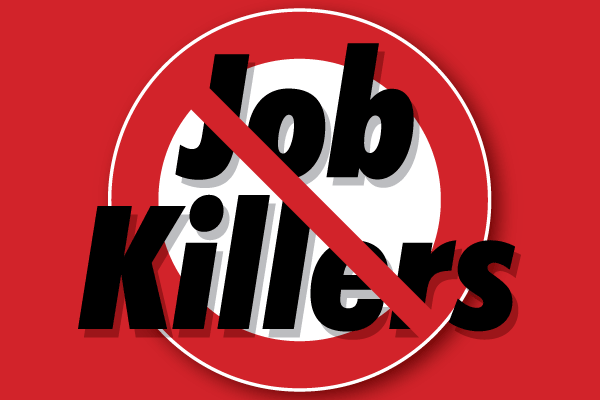
The California Chamber of Commerce added two new job killers to its job killer list this week, bringing the total number of job killers to 27. The new job killer bills, AB 127 (Committee on Budget) and SB 774 (Leyva; D-Chino), were awaiting action by the full Senate and/or Assembly as Alert went to print.
Update 9/18/17: AB 127 was held on the Senate Floor on September 15. No vote was taken. SB 774 was on the Assembly Inactive File when the session ended on September 15.
Jeopardizes Energy Reliability
AB 127 threatens energy reliability by mandating the closure of the Aliso Canyon natural gas storage facility. The CalChamber has identified the bill as a job killer because it will eliminate jobs and place regional energy reliability at risk.
According to CalChamber’s opposition letter, the Aliso Canyon storage facility is integral to providing electricity and natural gas to Southern California. If Aliso Canyon is not operational, this could lead to a lack of capacity necessary to run the electric grid, resulting in job loss and potential public safety, health and negative economic consequences.
The ability to inject and produce natural gas from the Aliso Canyon facility is important to maintaining a reliable energy supply throughout Southern California. Moreover, the region that Aliso Canyon serves is an economic powerhouse for California.
Well over 5 million Californians work with private sector employers in various fields, from aerospace and biotech to goods movement and manufacturing. The region features key industries where the impacts of energy reliability, both natural gas or electricity, would cause major disruptions and ripple through the economy, affecting goods movement and the production of transportation fuels, industrial chemicals and medical gases, among others.
Last session, the Legislature passed and the Governor signed SB 380 (Pavley; D-Agoura Hills; Chapter 14), mandating an extensive, multi-agency safety review and public hearing process to evaluate the Aliso Canyon facility. The steps required under this recently enacted law are underway. It is premature to mandate the elimination of this facility before the state agencies undertaking this extensive process have made a final decision, CalChamber argues in its letter.
Adds Costs for Permittees
SB 774 will establish the California Toxic Substances Board (CTSB) within the Department of Toxic Substances Control (DTSC). The job killing proposal requires DTSC to adopt a new fee schedule by January 1, 2019 “at a rate sufficient to reimburse the department’s costs to implement” its statutory requirements.
In its opposition letter, the CalChamber explains that this will result in significant new and additional costs being imposed on permittees as evidenced by the existing structural deficits in both the Hazardous Waste Control Account and the Toxic Substances Control Account—which are the two primary sources of funding for DTSC—and the estimated $3 million annually plus the significant-yet-unknown one-time costs relating to SB 774.
CalChamber’s analysis of the bill finds that SB 774 will create an additional bureaucratic layer that will not promote efficient and effective permitting or site cleanup. The authority, duties and powers vested in the CTSB make clear that it is not just an “oversight board.” The new “collaboration” requirement in the amendments will have no practical effect other than to drive up costs that will be passed through to permittees.
The bill has been tagged a job killer because it bypasses public participation and input by allowing DTSC to adopt future fee schedules as “emergency” regulations when such regulations will have significant impacts on permittees’ ability to continue to provide vital services to California communities.
SB 774 also creates significant uncertainty by giving the CTSB the power to disregard the administrative record and allowing it to impose conditions on hazardous waste permits and require various actions relating to site cleanup following a single hearing, and stating the director “shall comply” with such directives.
In the opposition letter, CalChamber warns that SB 774 will “result in the hazardous waste being sent out of state, where the waste would be treated as garbage and thus subject to few if any environmental protections, contrary to California’s goals.”
Staff Contacts: Amy Mmagu, Louinda V. Lacey

